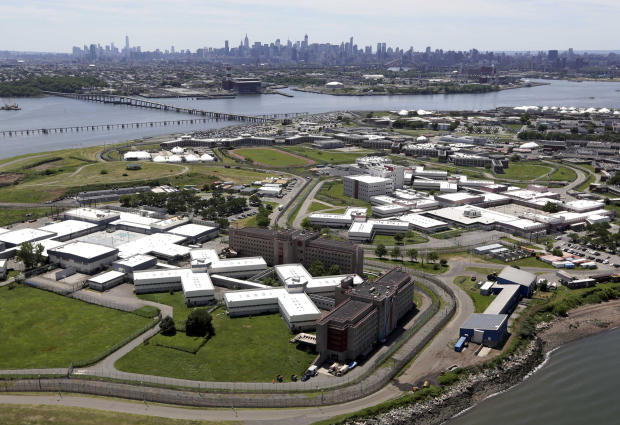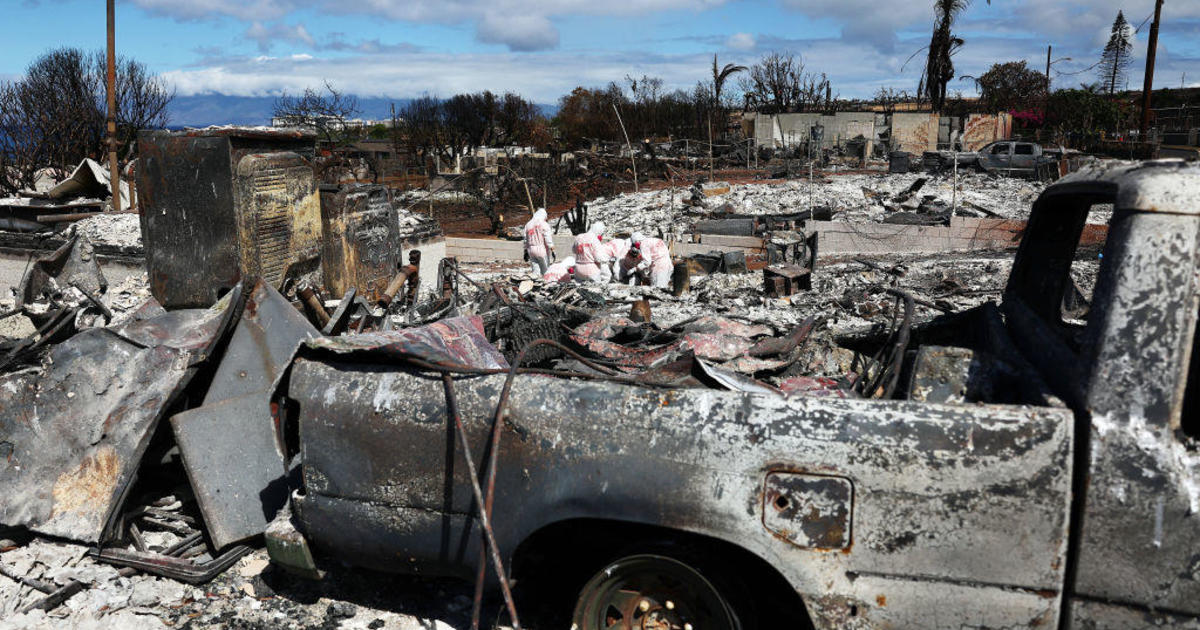Leaving Rikers Island and coming home to a pandemic
Reynaldo Lopez was released from New York City's Rikers Island jail last month after spending two months behind bars on a parole violation. The 50-year-old was greeted with a home-cooked meal — fried chicken, macaroni and cheese, green beans and cornbread — but he couldn't hug his wife, Millicent, when she welcomed him back to their home in the Bronx, out of fear that he could expose her to the coronavirus.
"I didn't want to spread the virus to my family," Lopez told CBS News.
Jails and prisons, where social distancing is nearly impossible, have emerged as potent breeding grounds for the new coronavirus. More than 1,300 people in the New York City jail system have tested positive for the virus, according to the city's Department of Corrections. Three inmates have died, along with 10 staffers. Raymond Rivera, one of the inmates who died, was also being held on a parole violation at Rikers, by far the city's largest jail complex.
As the pandemic began to ravage New York last month, the city started releasing inmates who were held on technical parole violations or awaiting trial on minor crimes from Rikers and other facilities. More than 2,200 people have been set free across the city since March 16, according to the Mayor's Office of Criminal Justice. But former inmates, health care workers and advocates say the release process is overwhelmed, offering little guidance for some inmates who are suddenly thrust back into society, many of whom may have been exposed to the virus themselves.
Lopez, a former social worker who was on parole for a 2004 conviction for armed burglary, is one of 210 people who were released with the help of the Legal Aid Society, which provides legal representation for those who can't afford it. After he was released on March 31, he spent the next 14 days self-isolating away from his family, huddled in a bedroom with his essentials: books, weights, and his cellphone, with no clear cut plan for his future.
"The whole world is out of work, but I'm happy to be home, I'm grateful," Lopez said.
At Rikers, Lopez was housed in a dorm with other men his age who were also there for parole violations. He said they all developed a bad cough along with shortness of breath. Lopez was frustrated at the release process, calling it "total chaos." He said his final medical screening was rushed and he didn't have a re-entry plan for his life post-incarceration. "I was never given no type of release plan or an opportunity to see a psychiatrist if I needed it because of what was going on inside. There was no follow-up plan."
Another man who was recently released from Rikers earlier this month also claimed his final screening was rushed, saying he never had his temperature taken and was not given a face mask or gloves before his release.
Two employees with Correctional Health Services (CHS), the city agency that oversees inmate care, confirmed that many inmates at Rikers can't get the help they need due to the sheer volume of people being released. The employees, who were not authorized to speak publicly, said many health care workers have called out sick or now work remotely, adding further strain to an already stressed system.
"You have a mass amount of guys getting released when no one is there. So, there's no way for us to plan for them getting out, and there's also no way for us to ensure that their service is in place," one CHS employee said.
The city has prioritized releasing inmates who were being held for violating parole, serving a jail sentence of less than one year or awaiting trial on current charges. Most inmates technically remain in the custody of the city Department of Corrections but are allowed to serve the remainder of their sentence at home.
A CHS spokesperson said people entering and leaving the jail undergo medical and mental health screenings. Prior to an inmate's release, health care workers screen and identify anyone who may have COVID-19, the disease caused by the virus, and advise them to self-isolate. Anyone who needs to self-isolate but requires special accommodations are referred to hotels and other supportive services, the CHS spokesperson said.
Shelters are also overwhelmed, the employees said, and some inmates will ultimately end up on the streets. "We're releasing them to shelters or programs with no resources," a CHS employee said. "We're not helping them in that way at all right now, so that's just upsetting."
"Sometimes it feels like sending people to their deaths," one of the CHS employees said.
The pandemic has forced the caseworkers tasked with implementing re-entry programs to the sidelines. These programs are meant to help inmates transition back into the community by lining up housing, health care, job training and more. Caseworkers typically work with inmates to develop a personalized plan inside the jail prior to release.
But many caseworkers have been working from home, making it difficult if not impossible for some patients to get support before they are released. Non-profit organizations that can provide support have set up hotlines, distributing numbers throughout jails, but have found that identifying clients from the outside can be hit-or-miss.
"That lack of easy communication and connection makes discharge planning, in a systematic and comprehensive way, very challenging," said Susan Gottesfeld, executive vice president and chief program officer at the Osborne Association, a re-entry organization that now provides all of its services virtually, including case management, job training, substance abuse treatment and health care.
Gottesfeld said those services are still available once someone gets out, but "it's better when we work with them pre-release so we can make sure there's a plan for them. There are a lot of pieces that need to be coordinated when people are leaving."
"[The pandemic] really shines a light on our willingness to lock up more people than we really need to be and it's testing the way our criminal and legal system makes decisions about who is taken into custody and who can be released in less restrictive supervision in the community."
For those who show symptoms after they're released, Gottesfeld said they may be moved to a hotel for symptomatic people if necessary, where they'll receive medical care.
New York City operates 11 jails, eight of which are on Rikers Island. It's unclear how many confirmed virus cases are within the complex, but as of Tuesday, there were 1,384 people sickened by the virus in city-run jails, including 1,005 Department of Corrections staffers and 379 inmates. "People are very aggravated. We're scared of dying here," one Rikers inmate said.
The man who was released from Rikers earlier this month said it was a relief to be back home with his family members, who are over 60 years old. "I didn't want them to go out getting groceries, so now I can go and do those things, looking out for them and making sure the house is clean," he said. "This is no joke. My dad just lost his uncle, he was 83. My brother got it. He's feeling better and better. But there's people close to me who are getting it. We're just trying to stay clean and safe here by not going out much and just riding it out like everybody else is."
Lopez, two inmates currently inside and another person who was recently released, said tensions at Rikers are at an all-time high. Several said blaring alarms that signal fights could be heard at nearly all hours of the day and night. They all independently claimed it was difficult to get medical attention unless you had a fever and displayed several symptoms of COVID-19.
"There was a sense of dread — that everyone was going to die," Lopez said.
A current inmate blamed the fights on the lack of recreation since most dormitories are under quarantine. Several said they watched officers sweep up sick inmates in the middle of the night and discard all of their belongings.
"I sit in my cell, I write music, I do sudoku puzzles. I study my case. But when I come out and observe, it's a lot, seeing it on people's faces — the energy," said the inmate. "People knowing their lives are in jeopardy, knowing that somebody just died."
Back home, Lopez said his wife began giving him turmeric, red onions, ginger and sea moss twice a day, which he attributes to helping clear up congestion in his lungs. Last week, he left his home for the first time to buy groceries, what he considered a small, but significant milestone. He said without the support of his wife, who maintained contact with his lawyer and produced reference letters for the judge, his release would have been "impossible."
At his former job, Lopez helped former inmates adjust to life after prison. He said he is enjoying time with his family and hopes to go back to school to earn a master's degree in social work. "People need help. A lot of people who have been to prison made bad choices, and some people got hurt, but thankfully, these people are gonna come back to the community — whether we like it or not."




